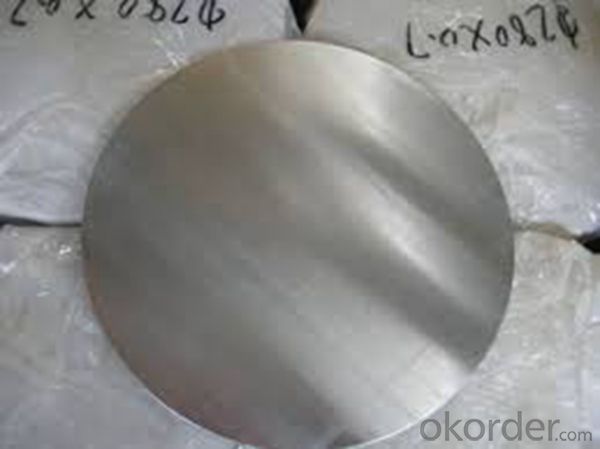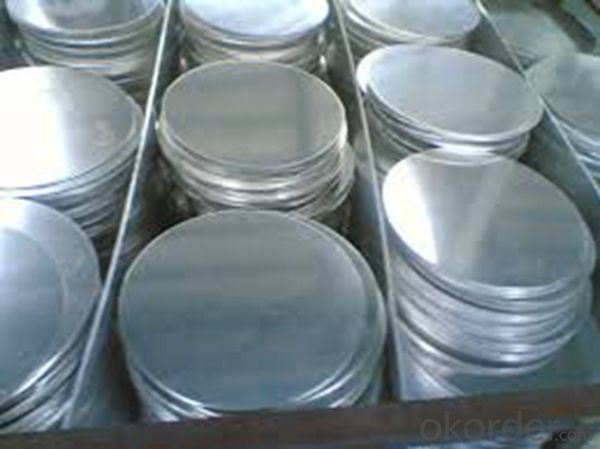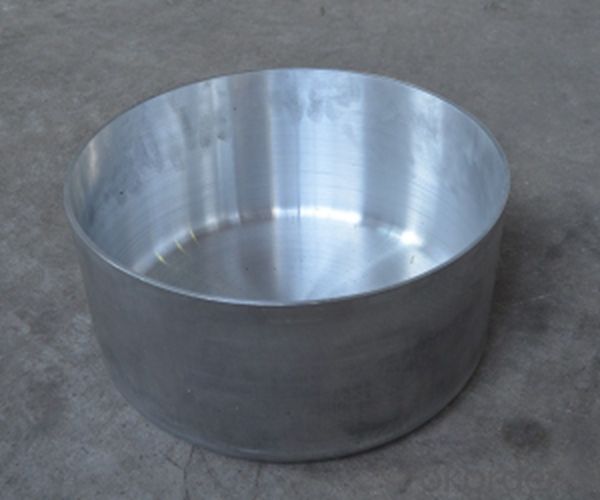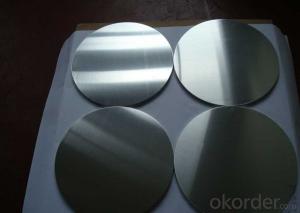EN AW- 1050A Mill Finished CC Aluminium Circle
- Loading Port:
- Shanghai
- Payment Terms:
- TT OR LC
- Min Order Qty:
- 5 m.t.
- Supply Capability:
- 2000 m.t./month
OKorder Service Pledge
OKorder Financial Service
You Might Also Like
Item specifice
1. Structure of EN AW- 1050A Mill Finished CC Aluminium Circle Description
EN AW- 1050A Mill Finished CC Aluminium Circle is one semi-finished aluminium material. The alloy AA1050 is widly used in building, industry ect. Its weight is much lower than steel. So many customers choosed aluminium material instead of steel.
2. Specification of EN AW- 1050A Mill Finished CC Aluminium Circle
EN AW- 1050A Mill Finished CC Aluminium Circle | |
Main Specification | |
Alloy | AA1xxx (AA1050, AA1060, AA1070, AA1100 etc.) |
AA3xxx (AA3003, AA3004, AA3005, AA3105 etc.) | |
AA5xxx, AA6XXX (AA5052,AA5083, AA5754, AA6061, AA6062 etc.) | |
AA8xxx(AA8011, AA8006 etc.) | |
Temper | H14,H16, H18, H22, H24, H26, H32,O/F, T4, T6, T651 |
Thickmess | 0.01mm-100mm |
Width | 30mm-1700mm |
Standard | GB/T 3880-2006/ASTM |
Special specification is available on customer's requirement | |
3. Application of EN AW- 1050A Mill Finished CC Aluminium Circle
(1).Interior: wall cladding, ceilings, bathrooms, kitchens and balconies, shutters, doors...
(2).Exterior: wall cladding, facades, roofing, canopies, tunnels,column covers , renovations...
(3).Advertisement: display platforms, signboards, fascia, shop fronts...
4. Feature of EN AW- 1050A Mill Finished CC Aluminium Circle
Surfact Quality :
Be free from Oil Stain, Dent, Inclusion, Scratches, Stain, Oxide Dicoloration, Breaks, Corrosion, Roll Marks, Dirt Streaks and other defect which will interfere with use,
Mechenical Property:
Chemical Composite and Mechanical Property
5. Certificate of EN AW- 1050A Mill Finished CC Aluminium Circle
SGS and ROHS(if client request, paid by client), MTC(plant provided), Certificate of Origin(FORM A, FORM E, CO), Bureau Veritas and SGS (if client request, paid by client), CIQS certificate
6. Image of EN AW- 1050A Mill Finished CC Aluminium Circle



7. Package and shipping of EN AW- 1050A Mill Finished CC Aluminium Circle
First, plastic cloth with drying agent inside; Second, Pearl Wool ; Third, wooden cases with dry agent , fumigation wooden pallets, aluminum surface could cover blue PVC film
8. FAQ
1) What is the delivery time?
Depends on actual order, around 20 to 35 days
2) What is the QC system:
We have QC staff of 20 persons and advanced equipment, each production is with MTC traced from Aluminum ingot lot.
3) What market do you mainly sell to?
Australia, America, Asia, Middle East, Western Europe, Africa etc
- Q:What’s the production standard of aluminum coil?
- GB/T3880-2006 mechanical standard GB/T3190-1996 chemical standard
- Q:Cost of aluminium coil coating fluorocarbon paint?
- Metal aluminum coil fluorocarbon paint that you don't know, Party A has no life, specific indicators of fluorine content in the product price between 120-180 GB / kg (according to different prices in different colors, the price from low to high color from shallow to deep) per kilogram spraying 3-5 square meters (according to the construction process and the environment skilled workers, such as spraying area under the influence of objective factors) warranty period for more than 15 years, GB product prices between 80-150.
- Q:How to identify the quality of color coated aluminum coil and sheet?
- Color coated aluminum coil is a kind of aluminum coil. As for qualified color coated aluminum coil, the surface has no impression, holiday and damage through the coating, and also no ripple, scratch and swell. All these are easy to see. However, the most important is the color difference of the color coated aluminum coil which is not obvious but will influence the decoration effect. Now the surface of curtain wall aluminum sheet will also be treated with electrostatic spraying. The power coating materials can have dozens of colors and realize good decorative effect, with polyurethane, polyethylene expansion resin and epoxy resin as raw materials, high color retention pigment as auxiliaries.
- Q:What are the common maintenance practices for aluminum coils?
- To maintain aluminum coils in good condition, it is necessary to regularly clean them, inspect for any damage or corrosion, and ensure proper airflow around them. Cleaning is crucial to eliminate accumulated dirt, debris, and other contaminants. This can be achieved by gently brushing or vacuuming the coils, or by using a mild detergent and water solution for more stubborn dirt. It's important to avoid the use of harsh chemicals or abrasive materials that could harm the aluminum surface. Inspecting the coils for damage or corrosion is also essential for their performance and longevity. Any signs of physical damage, like dents or bends, should be promptly addressed to prevent further deterioration. Additionally, corrosion can occur due to exposure to moisture or chemicals, so it's important to check for rust or discoloration. If corrosion is present, it should be treated and the cause of it should be identified and resolved to prevent future damage. Proper airflow around the coils is crucial for efficient operation. Obstructions or blockages in the surrounding area should be cleared to ensure adequate air circulation. This may include removing debris or objects that restrict airflow and ensuring appropriate spacing between the coils and nearby objects. Regular inspection of air filters and the ventilation system is also important to prevent any restrictions that could hinder airflow. In conclusion, regular cleaning, inspection, and maintenance of aluminum coils are necessary to ensure optimal performance and prolong their lifespan. It is advisable to follow manufacturer guidelines and seek professional advice if any issues or concerns arise.
- Q:Can aluminum coils be used in the production of aluminum composite roofs?
- Yes, aluminum coils can be used in the production of aluminum composite roofs. Aluminum coils are commonly used as the raw material for manufacturing aluminum composite roofs due to their lightweight, durability, and resistance to corrosion. The coils are typically processed and shaped into panels that are then used as the outer layer of the composite roof system, providing excellent protection against weather elements and ensuring long-lasting performance.
- Q:Are there any limitations on the width-to-thickness ratio of aluminum coils?
- Yes, there are limitations on the width-to-thickness ratio of aluminum coils. The specific limitations depend on various factors such as the intended application, manufacturing process, and the mechanical properties of the aluminum alloy being used. Generally, a higher width-to-thickness ratio can result in increased material instability, difficulty in handling, and potential quality issues. Therefore, it is necessary to carefully consider these factors and consult industry standards and guidelines to determine the appropriate width-to-thickness ratio for aluminum coils.
- Q:What are the different coil leveling options available for aluminum coils?
- Aluminum coils can be leveled using various methods, depending on the specific needs of the application. These options include roller leveling, stretch leveling, tension leveling, and precision leveling. Roller leveling is a commonly used technique that involves passing the coil through a series of rollers. These rollers apply pressure to gradually reduce the thickness of the material and correct any imperfections. This method is efficient and can accommodate different coil sizes and thicknesses. Stretch leveling, on the other hand, involves controlled stretching of the aluminum coil. Powered rollers elongate the material, removing residual stress and improving flatness. This method is particularly effective for thicker and wider coils. Tension leveling utilizes tension to eliminate waviness or unevenness in the coil. The material is passed through bridle rolls that apply tension, resulting in a flattened coil. This technique is commonly used for thinner gauges of aluminum and allows for high-speed processing. For high-precision applications, precision leveling is recommended. This specialized process combines roller leveling, stretching, and tensioning techniques to achieve extremely flat and uniform coils. Industries such as aerospace, automotive, and electronics often rely on precision leveling. Overall, the choice of leveling method for aluminum coils depends on factors like desired flatness, thickness, width, and application requirements. Each technique has its own advantages and limitations, so it is crucial to select the most suitable option to ensure the production of high-quality end products.
- Q:Which aluminum roll is good?
- Buy aluminum volumes, choose Shanghai Jin language metal materials Co., Ltd., Shanghai Jin language metal materials Co., Ltd. is committed to aluminum coil wholesale, sale and processing. Complete product specifications, quality assurance, brand strength has very good cutting characteristics of Gaoyang welding, the main products are pure aluminum, aluminum alloy, aluminum pattern, Japan Sumitomo mirror aluminum, aluminum and other materials imported from South Korea, widely used in home appliance industry, stamping, sheet metal production, decoration, curtain wall, automobile industry, mold processing. Ship manufacturing, pipe insulation, lighting, advertising signs, etc..
- Q:What are the different grades of aluminum used in coil manufacturing?
- The different grades of aluminum commonly used in coil manufacturing include 1100, 3003, and 5052. These grades vary in their chemical composition, mechanical properties, and suitability for various applications.
- Q:How long do aluminum coils typically last?
- The typical lifespan of aluminum coils is approximately 15 to 20 years, but their longevity is heavily influenced by various factors including the quality of the aluminum, the installation process, and the maintenance and care given to them. The lifespan of the coils can be significantly prolonged by regularly maintaining them, such as by cleaning the coils and ensuring adequate airflow. Moreover, their durability can also be affected by environmental factors like exposure to severe weather conditions and corrosive substances. Hence, ensuring proper care and maintenance is crucial to guarantee the extended lifespan of aluminum coils.
1. Manufacturer Overview |
|
|---|---|
| Location | |
| Year Established | |
| Annual Output Value | |
| Main Markets | |
| Company Certifications | |
2. Manufacturer Certificates |
|
|---|---|
| a) Certification Name | |
| Range | |
| Reference | |
| Validity Period | |
3. Manufacturer Capability |
|
|---|---|
| a)Trade Capacity | |
| Nearest Port | |
| Export Percentage | |
| No.of Employees in Trade Department | |
| Language Spoken: | |
| b)Factory Information | |
| Factory Size: | |
| No. of Production Lines | |
| Contract Manufacturing | |
| Product Price Range | |
Send your message to us
EN AW- 1050A Mill Finished CC Aluminium Circle
- Loading Port:
- Shanghai
- Payment Terms:
- TT OR LC
- Min Order Qty:
- 5 m.t.
- Supply Capability:
- 2000 m.t./month
OKorder Service Pledge
OKorder Financial Service
Similar products
New products
Hot products
Related keywords





























